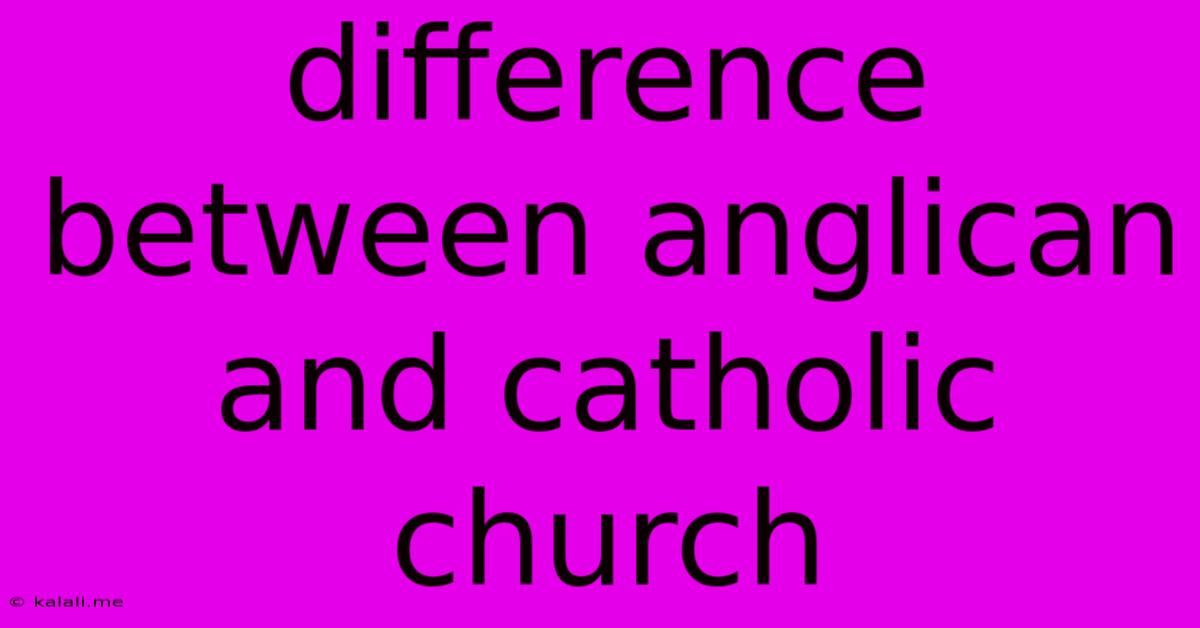Difference Between Anglican And Catholic Church
Kalali
May 22, 2025 · 3 min read

Table of Contents
Anglican vs. Catholic: Understanding the Key Differences
The Anglican and Catholic Churches, while sharing historical roots and some liturgical similarities, have distinct theological, doctrinal, and structural differences. This article will explore these key distinctions to help clarify the nuances between these two significant branches of Christianity. Understanding the differences can help foster greater respect and understanding between the two communities.
What are the main differences between the Anglican and Catholic Churches? The core differences lie in their understanding of authority, the role of scripture and tradition, the nature of the Eucharist (Holy Communion), and the papacy.
1. Authority and the Role of Scripture and Tradition
-
Catholic Church: The Catholic Church emphasizes the authority of Sacred Tradition alongside Sacred Scripture. Tradition, encompassing teachings, practices, and beliefs passed down from the apostles, is seen as equally authoritative with the Bible. The Magisterium, the teaching authority of the Church, interprets both Scripture and Tradition.
-
Anglican Church: The Anglican Church also values tradition, but places greater emphasis on Scripture as the primary source of authority. The Anglican tradition often incorporates elements from various historical periods and interpretations, leading to a broader range of theological viewpoints within the Church. While there is an established hierarchy, its authority is not considered absolute in the same way as the Catholic Magisterium.
2. The Eucharist (Holy Communion)
-
Catholic Church: Catholics believe in the doctrine of Transubstantiation, where the bread and wine literally become the body and blood of Christ during the Eucharist. This is a central aspect of Catholic worship and theology.
-
Anglican Church: Anglican views on the Eucharist vary. While many Anglicans believe in a real presence of Christ in the Eucharist, the precise nature of that presence is debated. Different Anglican traditions hold different views, ranging from a symbolic interpretation to beliefs closer to the Catholic understanding of Transubstantiation. This diversity of theological perspectives is a defining feature of Anglicanism.
3. The Papacy
-
Catholic Church: The Pope, the Bishop of Rome, is considered the supreme head of the Catholic Church, possessing supreme authority in matters of faith and morals. This is a core tenet of Catholic belief and practice.
-
Anglican Church: The Anglican Communion does not have a single supreme head. Instead, it is a fellowship of autonomous national or regional churches, each with its own governance structure. The Archbishop of Canterbury holds a significant role as a symbol of unity and Primus inter pares (first among equals), but lacks the supreme authority of the Pope.
4. Sacraments
-
Catholic Church: The Catholic Church recognizes seven sacraments: Baptism, Confirmation, Eucharist, Reconciliation (Confession), Anointing of the Sick, Holy Orders, and Matrimony. Each sacrament is believed to confer God's grace upon the recipient.
-
Anglican Church: The Anglican Church generally recognizes two main sacraments: Baptism and Eucharist. While other rites and ceremonies are practiced, their sacramental status is debated among different Anglican traditions.
5. Clerical Celibacy
-
Catholic Church: Priests in the Roman Catholic Church are generally required to remain celibate.
-
Anglican Church: Anglican priests are permitted to marry.
Conclusion
The differences between the Anglican and Catholic Churches stem from historical events, theological interpretations, and differing views on authority. While sharing historical roots and some liturgical practices, their core beliefs and structures diverge significantly. Understanding these nuanced distinctions fosters a more informed appreciation of both traditions and their unique contributions to the Christian faith. The key takeaways are the differing interpretations of authority, the Eucharist, and the role of the Papacy, all shaping their distinct identities within the broader Christian landscape.
Latest Posts
Latest Posts
-
Clay Strips Tool Is Not Working
May 23, 2025
-
Can I Take Earlier Bus On Megabus Baltimore
May 23, 2025
-
Too Many Levels Of Symbolic Links
May 23, 2025
-
Replace Dumb Quotes With Smart Quotes
May 23, 2025
-
240 V Water Heater Stopped Working
May 23, 2025
Related Post
Thank you for visiting our website which covers about Difference Between Anglican And Catholic Church . We hope the information provided has been useful to you. Feel free to contact us if you have any questions or need further assistance. See you next time and don't miss to bookmark.